59 Search Results for aac and aphasia
June 17, 2013
by Carole Zangari -
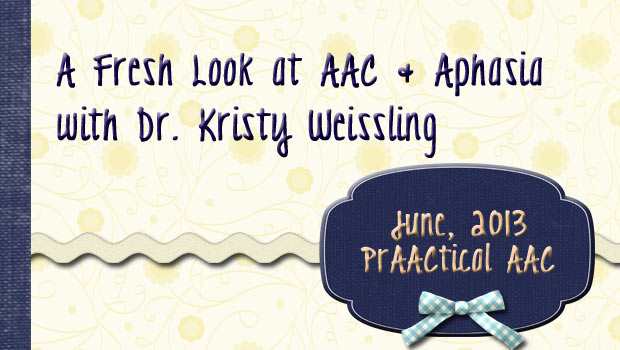
We’re so pleased to be able to share the thoughts of our friend and colleague, Dr. Kristy Weissling, on providing AAC supports to people with aphasia. She received her professional doctorate from Nova Southeastern University and is currently an Assistant Professor of Practice and clinical supervisor at the Barkley Speech-Language and Hearing Clinic at the University of Nebraska-Lincoln. Her research and teaching interests include, aphasia, cognitive communication impairments, and AAC. She participates in implementation of a portion of the RERC grant project at the University of Nebraska-Lincoln. She has been an instructor in aphasia and cognitive linguistic impairments for 15 years and teaches in both online and live formats. Her clinical load includes individual and group treatment of individuals with aphasia, traumatic brain injury, and early cognitive decline. In this post, Kristy reflects on three articles that have shaped her clinical services and teaching. :::::::::::::::::::::::::::::::::: I have been working with people who... [Read More...]
June 9, 2013
by Robin Parker -
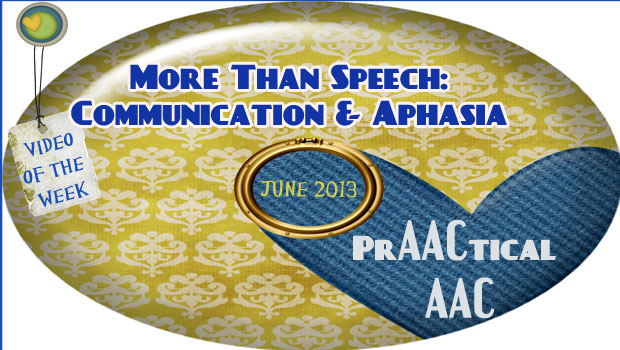
Life is Larger Than… APHASIA is the title of the Aphasia Institute’s 30th anniversary video made by group members, volunteers, and staff. Although life is larger than… APHASIA, the power of communication and sharing stories is so apparent. Enjoy the video, but check out the Aphasia Institute’s website for resources, information and a visual support for understanding the mission: “Giving hope to people with aphasia and their families by developing and sharing innovative solutions that reduce language barriers to full life participation”.
June 8, 2013
by Robin Parker -
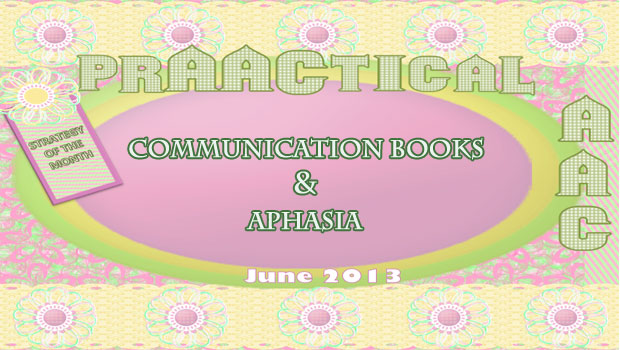
We know aphasia intervention has moved well beyond traditional speech and language training and intervention. We are so happy it has moved to an authentic participation, functional communication, and social interaction focus. Communication books are one tool for helping people with aphasia be active participants in conversation and comprehensive communication. Here are some thoughts and ideas about communication books to get started. Communication Books- Communication books for adults with aphasia can be in grid format with relevant communication messages. There can be a few pages or many, but keep in mind that the more pages, the longer it will take to navigate. It is most important to include high priority and relevant messages that will support needed communication and not just ‘standard’ messages. There are many samples and templates that can be purchased or downloaded for adult communication books. These may be good as a start, but should be individualized when... [Read More...]
June 4, 2013
by Carole Zangari -
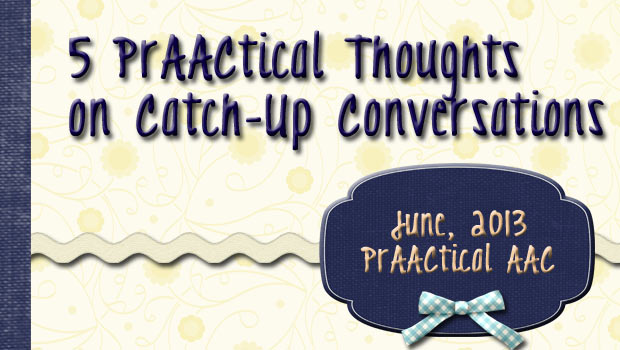
One of the things SLPs frequently do at the start of their therapy sessions is have some casual conversations with their clients to catch up on what happened since their last visit. Whether it is an elementary school student with ASD, a teenager with cerebral palsy, or an older adult with aphasia, we engage in polite conversation to find out what they’ve been up to and perhaps share a bit about our own experiences. Here are some thoughts on making those ‘catch-up conversations’ work from a prAACtical perspective. 1. Possible goal areas: initiate conversation; maintain dialogue on an established topic; redirect conversation to a new topic; respond to non-obligatory communication opportunities; use temporal terms in multi-word utterances; convey a personal narrative with a clear beginning, middle, and end; use regular past tense verbs; ask partner-focused questions 2. Core language targets: it, we, they, do/did, have/had, was/were, not It was (not);... [Read More...]
June 1, 2013
by Carole Zangari -
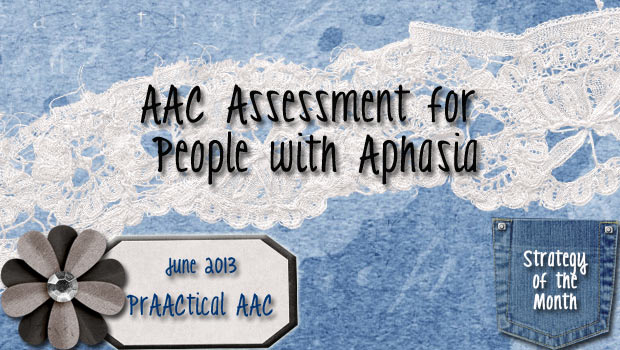
Many people with aphasia fail to regain sufficient speech and language skills to meet their communication needs. With more than one million people with aphasia in the US alone, chances are most people reading this know at least one person affected by the disorder. While many go on to regain functional speech and language skills, some remain unable to communicate well enough catch up with a neighbor, talk about bills with a spouse, ask a question in a store, play with a grandchild, or tell their healthcare providers about side effects or symptoms. It’s hard to really imagine how devastating and isolating this experience may be. Aphasia Awareness Month seemed like the perfect time to reach out to SLPs with information on AAC for people with aphasia. In this post, we’ll share some thoughts and resources on assessment. Assessment activities are, of course, driven by the purpose for which the... [Read More...]
April 5, 2013
by Robin Parker -
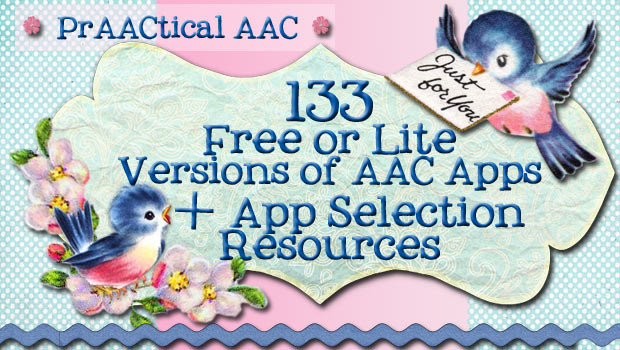
Here is our most recent update of free and lite versions of AAC apps for iOS and Android platform devices + a variety of resources related to AAC app selection. We strongly continue to advocate for a systematic process for AAC app selection. We recommend AAC app decision making in the context of a feature match process that gives appropriate attention to the full range of AAC options. Tools to Use In Making Decisions About AAC Apps Feature match form developed by Jessica Gosnell at Boston Children’s Hospital Feature match checklist created by Scott Marfilius and Kelly Fonner Our supplemental rubric covering language and communication features, RELAAACs Places to Go to Find AAC Apps and Reviews Comprehensive AAC app list for iPhone and iPad by Jane Farrall AAC Tech Connect’s Apps Assistant OCALI’s listing of apps for individuals with ASD Tech in Special Education Aidis Trust Communication App Reviews Training... [Read More...]
November 28, 2012
by Carole Zangari -
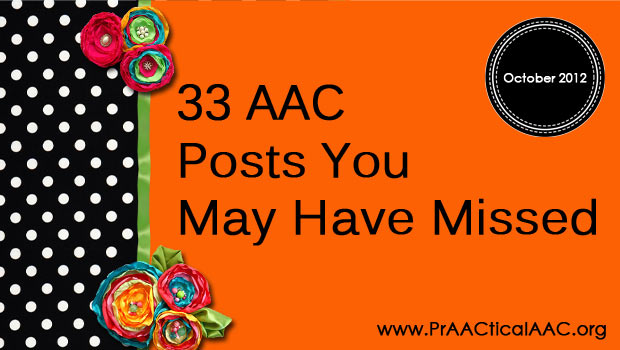
PrAACtical Goals That Matter It’s All About Us Free & Lite Versions of AAC Apps + App Selection Resources Beyond Behavior Problems: How Visual Supports Can Help Our AAC Teaching Fire Safety Week Over, Need to Learn Strategies is Not Watch What You Heat- Fire Safety 3 Communication-Behavior Visual Support Power Tools Simple Start: Visual Supports for Places Around School Ain’t No Stopping Us Now! Video of the Week No Introduction Needed A PrAACtical Look at Getting Started with AAC Symbols Creative Uses of the iPod for Students Who Use AAC Video of the Week: Helping Hands + Visual Supports A PrAACtical Look at the Incredible 5-Point Scale Strategy of the Month Avoiding Insanity: AAC & the Pace of Change Strategy of the Month: Building Acceptance of AAC The Path to Acceptance AAC & Change: Some Thoughts on Influencing Behavior Building Acceptance for AAC: Sharing Information AAC Awareness Month Global... [Read More...]
October 23, 2012
by Carole Zangari -
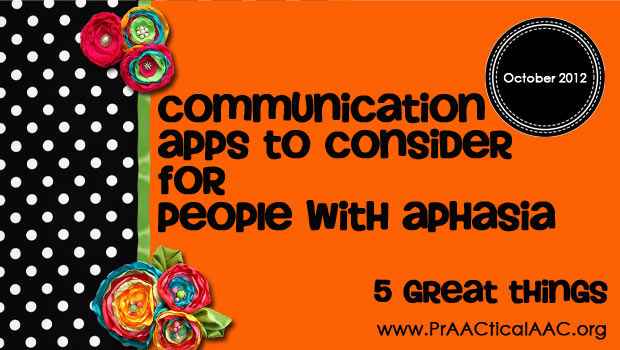
It’s hard for most of us to imagine the experience of having had language all your life and suddenly losing it. Here are some ideas for apps that may be useful in your therapy with people with aphasia. Scene and Heard from tBox Apps and Scene Speak from Good Karma Apps: We’d love to see more people with significant language deficits use visual scene displays to communicate. Lingraphica’s Small Talk Series and their TalkPath apps: Worth exploring these apps as they were designed expressly for this clinical population. Tactus Language TherAPPy apps: Looking for apps that will help your patient develop and practice language and writing skills? Tactus has several to explore. Pictello from AssistiveWare: There is great power in storytelling and one of the things missed most by people with acquired communication disorders is their ability to connect with friends and family. This app has great potential for sharing... [Read More...]
October 4, 2012
by Carole Zangari -
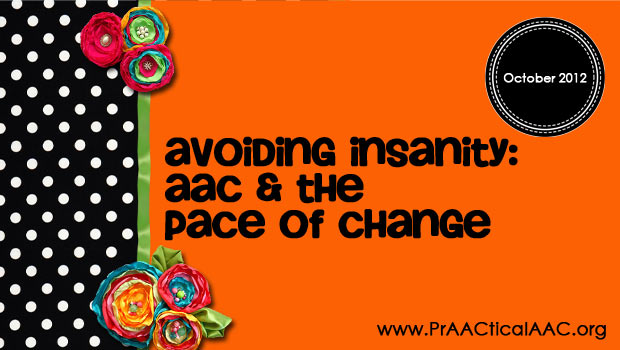
Although the field of AAC emerged only in the last few decades, the notion of communicating in alternative ways is centuries old. In classical times, the use of manual communication by deaf individuals was referred to by Plato and documented in Europe during the Middle Ages. In North America, American Indian Hand Talk evolved over generations to allow cross-cultural communication between speakers of diverse languages. As a clinical/educational field, AAC has been described as evolving through a “bottom-up” mechanism. Individuals with congenital conditions that prevented the development of intelligible speech invented their own communication systems long before teachers, therapists, and clinicians formalized instruction in alternative modes of expression. AAC users growing up in the forties and fifties tell of communicating through grunts, vocalizations, “air writing,” and eye movements, which, though effective in some contexts, were maddening in their limitations. Individuals who were fortunate enough to have access to habilitative and... [Read More...]
October 2, 2012
by Carole Zangari -
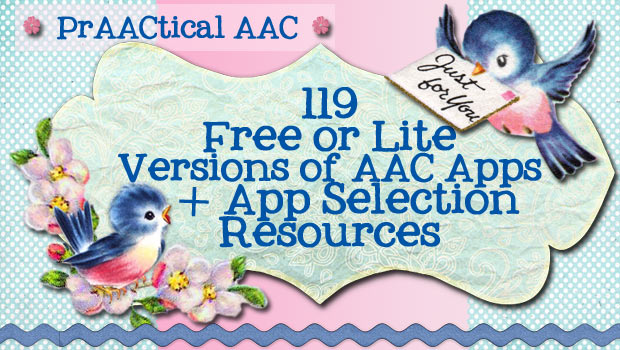
If you’ve been following our blog, you know that we have mixed feelings about the AAC app revolution. More specifically, we’ve had concerns about the decision-making process around app selection, the paucity of apps that allow for children to learn true generative language, and a few other things. We continue to advocate for AAC app selection to occur within the context of a feature match process that gives appropriate attention to the full range of AAC options. In this mega-post we’ve included our most recent update of free and lite versions of AAC apps for iOS and Android plus a variety of additional resources related to AAC app selection. Tools to Use In Making Decisions About AAC Apps Feature match form developed by Jessica Gosnell at Boston Children’s Hospital Feature match checklist created by Scott Marfilius and Kelly Fonner Our supplemental rubric covering language and communication features, RELAAACs Places to... [Read More...]









